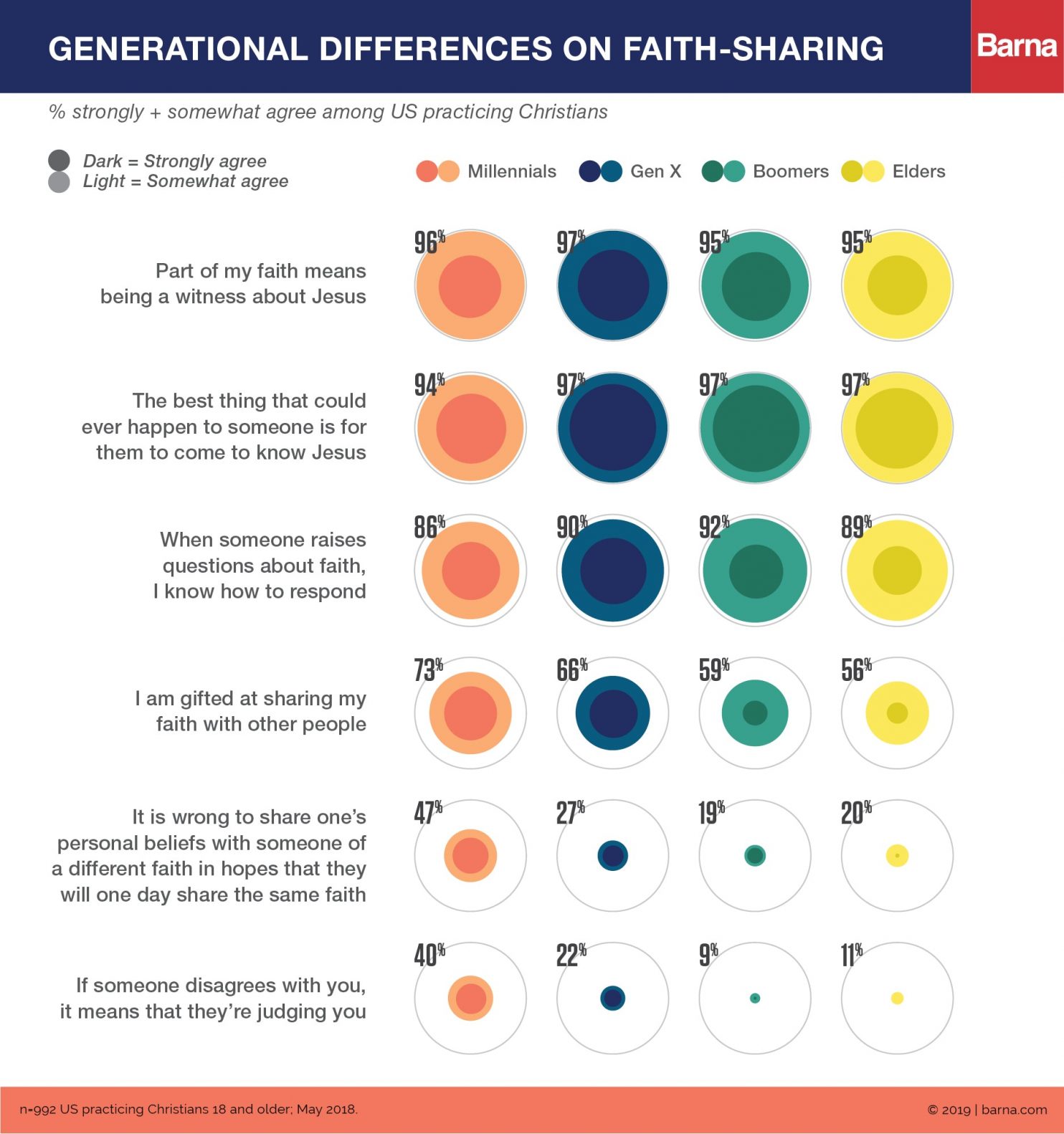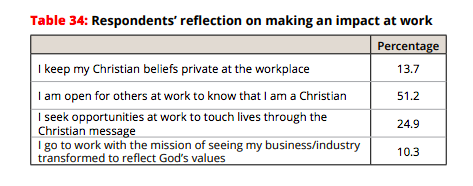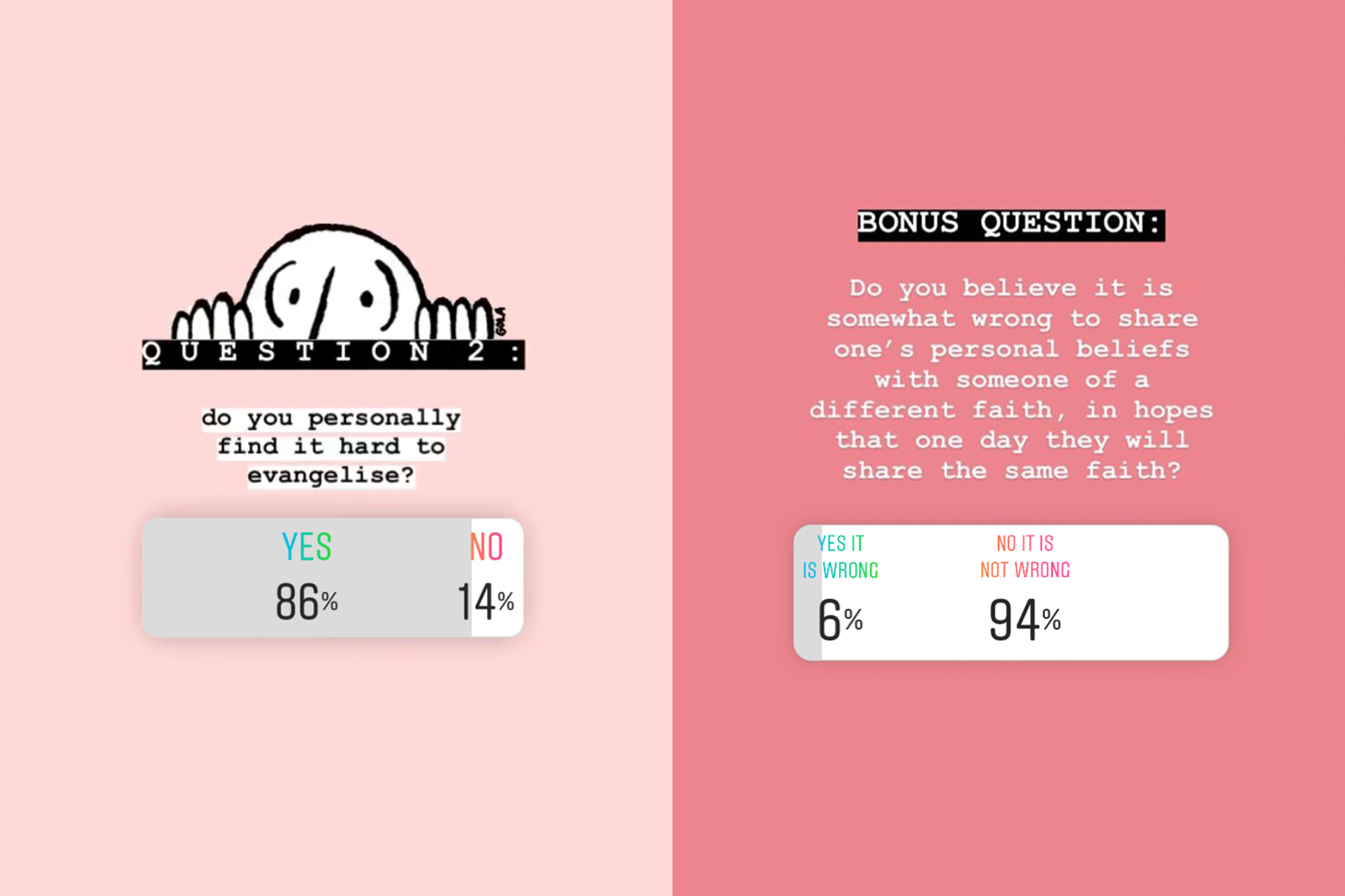Forty-seven per cent of Christian millennials in the US (born 1984-1998) think that it’s wrong to evangelise, according to recent research commissioned by Alpha USA.
Based on a report released by Barna a few days ago, more than 90% of these millennials believe that being a Christian witness is essential to their faith and that the best thing that could happen to someone is for them to know Jesus.
They are also the most equipped in sharing their faith (73%) compared to the generations before them.
In short, the majority of Christian millennials surveyed believe that sharing their faith is important and are perfectly capable of doing so. But nearly half of them displayed ambivalence towards the actual practice of evangelism.

Barna says that one possible reason is a cultural resistance to conversations that highlight people’s differences and a society that frowns upon proselytisation today.
In the same report, 40% of Christian millennials think that disagreement on matters of faith leads to judgment. That’s at least 2 times higher than other generation groups.
This finding is congruent to another study by Barna in which 3 out of 5 Christian millennials believe that people are likely to take offence if they shared their faith.
WHAT ABOUT SINGAPORE?
Although there hasn’t been a similar study conducted here, a Faith And Work research done by LoveSingapore in 2017 showed that only a third of Christian adults in Singapore aged 21 and above are intentional about being a witness at work and making their faith known (35.2%).
The remaining are passive (51.2%) or unwilling (13.7%).

We also recently conducted a simple poll among our followers on Instagram. It was heartening to see that – unlike the results from Barna’s US study – only 6% of around 1,000 who responded believe that it is wrong to share one’s personal beliefs with someone of a different faith in the hope that they will one day share the same faith.
However, 86% of respondents said they find it hard to evangelise, with one of the common reasons being not wanting to be pushy or disrespectful towards people of other faith, bringing to mind the same conflict that Christian millennials in the US have about evangelism.

While our survey is in no way large enough to be representative of the Christian population in Singapore, it does give us some idea of the issues that Christians here face.
Interestingly, these undercurrents exist in Singapore where we have the freedom to openly share our faith!
Evangelism to anyone is permitted and protected here. In fact, Article 15(1) of the Singapore Constitution states that every “person has the right to profess and practise his religion and to propagate it”.
What we should be mindful of is not putting down any other faith.
But in today’s politically sensitive and politically correct era, we might be so attuned to choruses such as “everyone is entitled to their own opinion” and “truth is subjective anyway” that we corner ourselves into a space of fear when it comes to sharing the Gospel.
And yet we mustn’t let culture shape truth. We have an unchanging Gospel that is relevant through time and history (2 Timothy 3:16-17). We mustn’t let the shifting sands of culture stand in the way of the Great Commission.
1. The Great Commission is a mandate to all believers
When Jesus was on earth, he had only one mission: To preach the kingdom of God (Luke 19:10, Luke 5:32). And it was this mission that he passed on to his disciples as part of his final words after His resurrection.
“Therefore go and make disciples of all nations, baptizing them in the name of the Father, and of the Son, and of the Holy Spirit, and teaching them to obey all that I have commanded you. And surely I am with you always, to the very end of the age.” (Matthew 28:19-20)
In the Parable of the Lost Sheep, Jesus also speaks of his heart for the lost: He doesn’t just passively wait for the sheep to be found – he goes out to find the lost sheep (Luke 15:3-7).
If Jesus, our Lord, lived and breathed a missional lifestyle, how can we, as followers of Christ, remain indifferent to the Gospel? It must have a bearing on us just as it did on Jesus.
2. The Great Commission has eternal significance
While most of us can agree that the Great Commission is an important part of the Christian faith, cultural resistance towards proselytisation has eroded some of our urgency – and perhaps even value – for the Gospel to be preached.
We might be afraid of judgment or feel that it’s oppressive to share our beliefs. But we need to remind ourselves why the Great Commission is important in the first place: Because it concerns a person’s salvation and eternity.
As Christians, we believe that mankind is destined for eternal destruction because of sin (Romans 6:23). But God died in our place for our sin, and those who believe and accept Jesus into their lives receive salvation for eternity. Now, we are to tell others of this Good News so that they too can receive salvation.
“How, then, can they call on the one they have not believed in? And how can they believe in the one of whom they have not heard? And how can they hear without someone preaching to them?” (Romans 10:14)
If we do not participate in the Great Commission, then many are going to lose out on eternity. So rather than asking ourselves if we should evangelise, the question we should ask is how do we share our faith while remaining loving and sensitive to our friends and family?
3. The Great Commission is why the Church exists
The Church has many purposes ordained by God but at its core, the Church exists for the people who have yet to come into the family and house of God.
The overarching theme of the Bible shows how God repeatedly reached out to mankind to restore the relationship between God and man. As ambassadors for Christ, God has entrusted to us the ministry of reconciliation (2 Corinthians 5:18-20).
To downplay the role of evangelism is to negate the core of Christianity, the Word of God and what Jesus has done. It is a downward spiral towards apostasy – something that God has warned us against (2 Timothy 4:3-4).
When such a day comes, it will be the devil that delights in such delusion (2 Timothy 2:25-26).
If we don’t respond quick enough, the cultural climate towards evangelism today will determine our stand on the professing of one’s faith tomorrow.
It’s not enough just to believe the Great Commission: We need to embrace it and walk the talk. If the Church fails to respond rightly, this will mark the beginning of its death.
We want to hear from you! Leave us a comment below on any of the following, or share with us any questions you might have on evangelism.
- Do you feel that the culture today makes it hard to evangelise in Singapore?
- What does the Great Commission mean to you?
- Can we love and respect a person’s beliefs, but still share our faith in the hope they will come to know Jesus? Or are they mutually exclusive?









